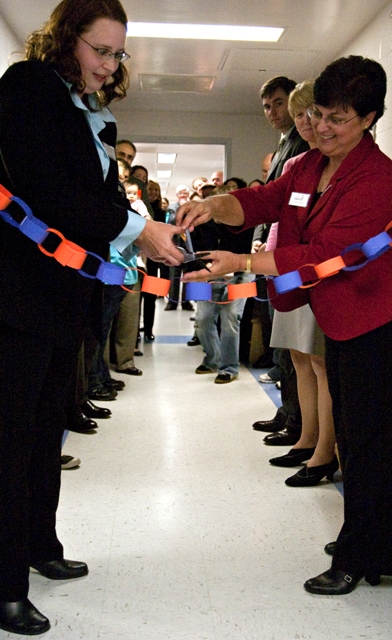
Ryan, a new student at Baby Gator, entertains Dr. Pam Pallas (center) and Pauline Cowart. Fellow Baby Gators Marcus (left) and Lucinda enjoyed watching.
Wade into a classroom at the Baby Gator center and find yourself knee-deep in happy toddlers and surrounded by the clapping sound of plastic toys being spilled onto the floor.
It’s not your average day care center, however.
The new Baby Gator center features developmentally appropriate curriculum and play-based learning. Teachers engage children in activities based on their developmental ability rather than age. The center also supports training and research opportunities for students and faculty.
This is why parents of 2-year-old Srivani moved their daughter from a local day care to UF’s second and newest Baby Gator Child Development and Research Center. Madhuri Sankuratri – a faculty member at the College of Medicine’s division of infectious disease – and her husband, Venkat, enrolled their little girl in the Baby Gator program several
months before the new center finally opened on Monday, Jan. 5.
“We (are) comfortable knowing that Srivani is in a stable environment and receiving quality care,” said Mrs. Sankuratri.

Dean Michael Good (third from right) and other UF administrators look on as Dr. Pam Pallas (left) and Lisa Roberts, associate director of the new center, cut the ribbon at a ceremony to officially open the Baby Gator Child Development and Research Center on Tuesday, Jan. 20. Photo by Sarah Kiewel.
The new center, located on the ground floor of the Health Science Center’s Human Development Building on Newell Drive, is funded by the colleges of Medicine and Public Health and Health Professions and serves children age 6 weeks to 5 years. Slots are allotted based on each college’s financial contribution: 106 slots are reserved for College of Medicine affiliates and six for PHHP. Forty-five youngsters showed up Tuesday, but the center has enough space for 112. Children of full-time undergraduates, graduate students, interns, residents, post-docs, fellows and faculty of those colleges can attend the center.
The facility is bright and spotless, but inviting with new furniture, colorful toys and learning tools. It was created with National Association for the Education of Young Children accreditation standards in mind. Baby Gator Director Pamela Pallas, Ph.D., said she will seek accreditation as soon as the new center becomes eligible next year. UF’s first Baby Gator center, which opened nearly 40 years ago on Village Drive, has been NAEYC accredited since 1992.
“Baby Gator is more than a day care,” Pallas said.
In addition, some teachers use sign language, which is valuable for communicating with children who are too young to express themselves with words.
Pallas also welcomes researchers into the new Baby Gator classrooms. The Village Drive center has participated in numerous studies on child development, disabilities, parent-child relationships, and child behavior. Coordinators look forward to establishing new research collaborations with the health sciences colleges at the new location.
Pallas is proud that the colleges can help meet the needs of its students and faculty by giving them a convenient, on-campus option for child care. Parents can drop in during the day and see their children. Some mothers stop in to breastfeed their infants.
The Sankuratris say the approach gives their daughter the chance to have fun and excel.
For enrollment eligibility, visit http://www.babygator.ufl.edu/ or contact Melinda Silver, assistant director for enrollment, at mrsilver@ufl.edu or 273-8000.

